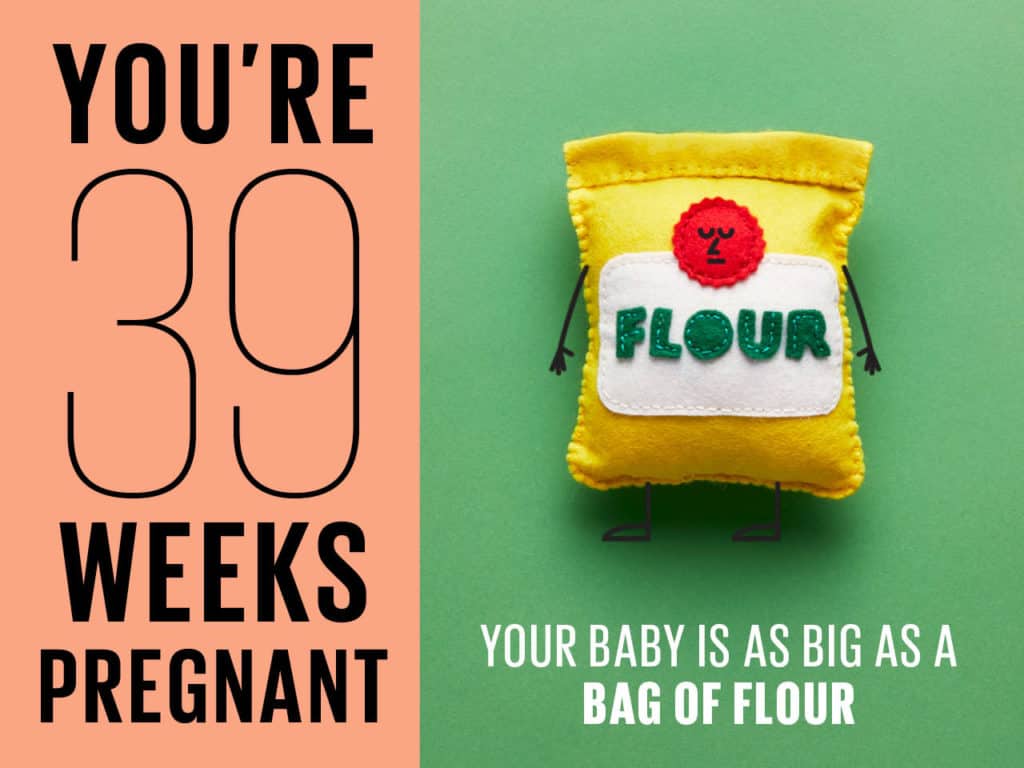
Table of Contents
Entered the 39 weeks of pregnant? Congratulations, you are now officially full term! In the 39 weeks of pregnancy, an average baby would ideally measure 19.9 inches long and weigh about 7.3 pounds. To put this in better perspective, the baby will be right about the size of a patch kid doll
What is Happening With the Baby When You’re 39 Weeks Pregnant?
At 39th weeks of pregnancy, you should ideally be now prepping up for delivery because the baby can literally pop out any time now! Here is what is happening in a 39th-week full-term baby’s body-
1. Baby Preps For Delivery
In week 39th pregnancy , a baby is called full term because they would be coming out in the world very soon now. Having said that, it should be noted, though the baby is old enough to take birth, their body is still putting down fat deposits, and their brain is also still developing rapidly to be able to adapt to the world outside the womb.
2. Less Definitive Baby Movements
At around the time of delivery, you can expect the baby’s kicks and turns to feel less definitive than before. Since the baby is preparing to pop out, they do not really have enough room in the womb at this point and hence, lesser movement and milder kicks. However, if you may have a reason to feel that the baby is unusually still, try having some cold water to wake them up or reach out to your doctor at the earliest.
3. New Skin Cell Generation
The baby, in the 39th week pregnant, is also already generating new skin cells and replacing the older ones. This is because the new cells are supposed to help with temperature regulation post-delivery.
4. White Skin
Your baby’s skin has undergone a transformation, transitioning from a pinkish hue to a current shade of white, irrespective of the ultimate skin color it will assume. The change is attributed to the deposition of a thicker layer of fat over the blood vessels, resulting in irresistibly round and kissable cheeks. Pigmentation, defining the long-term skin color, is anticipated to develop shortly after birth.
39 Weeks Pregnant: Symptoms in the Mother’s Body?
In the 39th week, before anything else, the anxiety and excitement of delivering are the most common and most obvious. You will be seeing your little one soon and while your body preps for the big day, here’s what you can expect from your body in the 39 week of pregnancy–
1. Braxton Hick Contractions
Braxton Hicks contractions, or false contractions as they are called, are supposed to be your body’s way to prepare you for the labor. These contractions can be differentiated from real contractions as they are shorter and much less painful. However, do not dismiss your contractions on the basis of a mere assumption that it would be Braxton Hicks. Take note of the tightening and when the contractions start to feel more evident and regular – this will be your pivot to real contractions!
2. Lightning Crotch
As funny as it may sound, lighting crotch is for real! Lighting crotch is essentially this brief, shooting pain felt in the pelvis, triggered by a baby’s internal movements. This phenomenon is painful because your baby’s head puts pressure on your cervix, disturbing tons of nerve endings in the area. Submerging your pelvic area in a bathtub or a pool can be of help.
3. Dilation and Effacement
Your doctor, in the 39th week, is most likely to enter a couple of fingers into your vagina to check if your cervix is opening and thinning, called dilation and effacement respectively. Dilation and effacement help determine if your labor has started or if it is yet to start. You might think that this is unnecessary but it really is not as some women might experience no-symptom early labor as the body preps for childbirth.
4. Vaginal Discharge
Vaginal discharge is sure a part of a woman’s life throughout her life, however, this discharge increases manifold in volume when you’re 39 weeks pregnant. It should also be noted here that amniotic fluid should not be mistaken for vaginal discharge – both phenomenon’s being common in the 39th week. Amniotic fluid can be differentiated as a thinner and watery liquid discharge. Always reach out to your doctor if you are unsure or even have the smallest of doubts.
5. Fetal Activity Changes
As the space within your baby’s living environment becomes more confined, you may observe shifts in fetal activity. With improved coordination, your baby is now less prone to making spontaneous jabs and kicks, and instead, movements may be perceived as twists and turns. Nonetheless, it remains essential to monitor your baby’s movements daily.
6. Water Breaking
Another indication that labor is approaching is the rupture of your amniotic sac, resulting in a gradual release of fluid. However, there’s no need to be concerned about your water breaking while you’re waiting in line at the grocery store. Contrary to cinematic depictions, the majority of women are already in labor and at the hospital when their water breaks. In the event that it does occur prematurely, it’s advisable to contact your healthcare practitioner promptly.
7. Pelvic pain
The pressure exerted by your baby’s head on your pelvis may lead to discomfort, accompanied by sensations akin to menstrual cramps and indigestion. These discomforts can also serve as early indicators of the onset of labor.
39 weeks Pregnancy Symptoms to not Ignore
If you experience any of the following indicators, consider it an urgent matter and promptly contact your doctor:
- Vaginal bleeding
- Brown or pink discharge
- Intense itching, especially during nighttime
- Unrelenting severe headache
- Vision issues such as blurring, light sensitivity, spots, or flashing lights
- Pain located just below the ribs
- Excessive swelling of the feet, ankles, hands, and face
- Persistent stomach pains
- Elevated temperature (above 37.5 degrees C) without other flu or cold symptoms
These are the 39 week pregnancy symptoms to not ignore.
39 Weeks Pregnant and No Signs of Labor?
At 39 weeks of pregnancy, it’s completely normal not to exhibit any signs of labor. For first-time mothers, the average onset of natural labor occurs around 41 weeks, while second-time mothers often experience it around 40 weeks. While some women may display early signs of labor, such as cervical dilation or effacement and regular contractions, weeks or days before delivery, others may rapidly progress from no dilation to 10 centimeters within a matter of hours.
Final Thoughts
As you near your final days of the term, here are some final words of guidance for you to end this blog. Take as much help as you may need from people around you because delivery is no joke and everybody understands that. There is absolutely no need of feeling embarrassed to reach out – after all the aches and pains, you really deserve an extra hand (or even a foot massage, who’s to say!). Above and over anything else, just chill out and wait for the baby to do what it has been preparing for. A storm is soon to arrive – just the most beautiful you’d ever witness!










